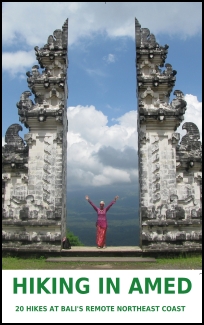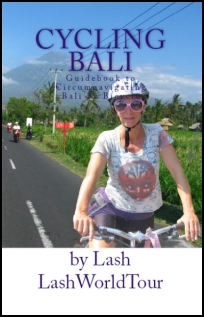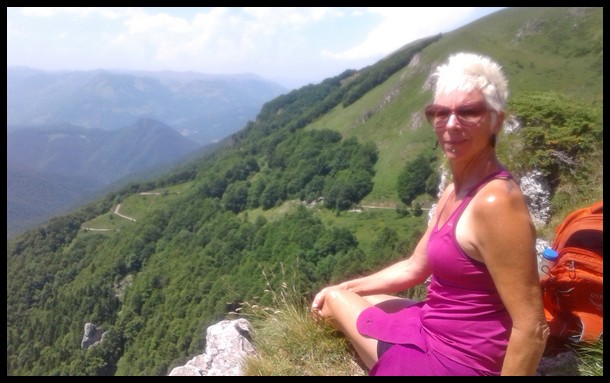
Lash on top of Budvaca Mt. – Biogradska Gora NP
Costs of Budget Travel in Montenegro in 2019
In June & July, 2019 I spent five solid weeks exploring the gorgeous Balkan country of Montenegro.
Highlights included Fjord-like Kotor Bay with its soaring mountains, three historic stone-walled fort towns, hiking in gorgeous pine forests & jagged mountain trails at spectacular Durmitor & Biogradska National Parks, driving through Moraca River & Tara River Canyons, camping at Camp Pod Ostrog & visiting Ostrog Monastery, cycling around a huge bird sanctuary at a defunct saltworks waterways and walking the rocky coastline at Ulcinj.
I stayed at a variety of accommodations, including Couch Surfing, private rooms in houses & apartments via Booking & AirBnB, one hostel and a farm-based campground.
I ate plenty of local food & fresh produce as well as cooking many meals for myself. I got around the country by buses, trains, taxis and hitch-hiking.
From my arrival, I really loved Montenegro and it just kept getting better as I traveled around. I highly recommend this country to other adventurous travelers.
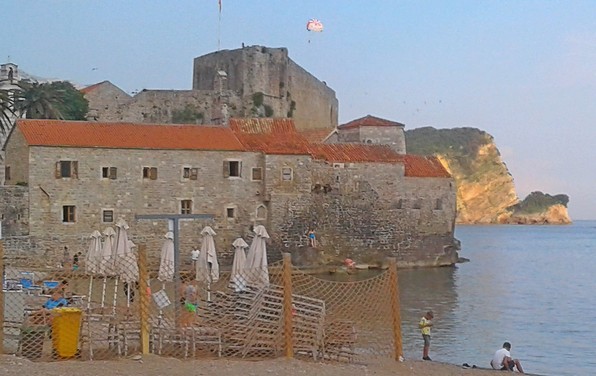
Budva old town
Cost-wise, as a budget traveler, I found Monetengro to be on par with Central America and just slightly more expensive than traveling around Mexico or SE Asia.
In this post I detail my costs for accommodation, food & drinks, transportation, entrance fees & miscellaneous expenses. I also give other useful information about accommodation & transportation conditions in the country.
If you don’t know much about Montenegro, you might also want to check my Introduction to Montenegro or 17 Surprising Facts about Montenegro.
Folllowing are my costs to travel around Montengro on a budget in 2019.
Montenegro uses the Euro as currency, partly because they are eagerly hoping to join the EU. At the time of my visit the Euro = $US exchange rate was:
1 Euro = $1.12-1.13 US
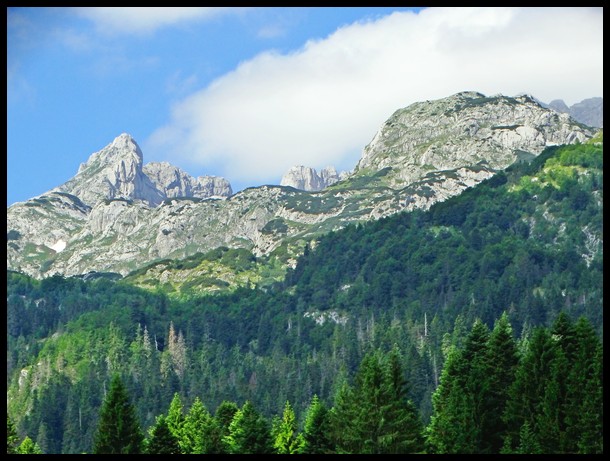
Durmitor National Park
My Total Costs and Daily Averages to Travel in Montenegro for 5 weeks
Total costs to travel in Montenegro for 5 weeks = $776.68 US
Total Room Cost for 5 weeks = $339.40 US
Total Food Cost for 5 weeks = $299.31 US
Total Transportation Cost for 5 weeks = $108.00 US
Total other expenses = $30
Total Monthly Costs (for 30 days, based on $21 daily cost) = $630 US
Average daily food expense = $8.09 US
Average nightly room cost (mostly private rooms) = $9.42 US
* note that daily room cost. not counting free nights at couch surfing = $16.16
Total daily average (including misc expenses) = $21 US per day
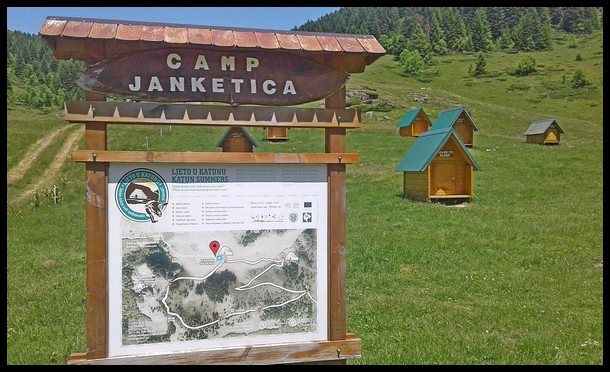
camp at Biogradska Gora NP
Costs of Accommodation in Montenegro for Budget Travelers
Montenegro has a variety of accommodation options for budget travelers. They include Couch Surfing, hostels, camping, private rooms in homes & apartments via Booking & AirBnB and ‘sobe’s, the Montenegran version of AirBnB.
All the major towns, cities and tourist destinations in the country have most or all of these options available.
Couch Surfing – If you’re not familiar with Couch Surfing, it’s an online community with hosts all over the world who put up travelers in their homes for free. Most hosts are travelers themselves who also use Couch Surfing as guests when they’re out on the road.
Couch Surfing hosts like helping out travelers, meeting new people from around the world, showing vistiors their city, practicing their English or other language skills and enjoying cultural exchanges with travelers.
I found at least a handful of CS hosts in most destinations I visited in Montenegro. I only ended up staying with two CS hosts – in Podgorica and Budva. Interestingly, both my hosts were Turkish nationals living/working in Montenegro.
I be-friended my Podgorica host and ended up staying with her twice. Even better, we’re still good friends and communicate every week.
Couch Surfing really brought down my acocmmodation expenses in Montenegro! I spend 14 nights out of 36 with couch surfing hosts, for free. That’s two weeks out of five.
As noted above, my accommodation average nightly cost, counting only nights I paid was over $16 US, rather than my final total average of $8.09 US. So staying with CS hosts literally cut my costs in half.
Hostels – At least a couple hostels, but usually several, are situated in all the country’s tourist destinations & major towns and cities. The going rate for a bed in a dorm room is about 8-12 Euro / $9-14 US in most places, with higher prices at some famous destinations like Kotor and Budva.
Note that these are rates during the high summer tourist season. Prices are probably lower in other months.
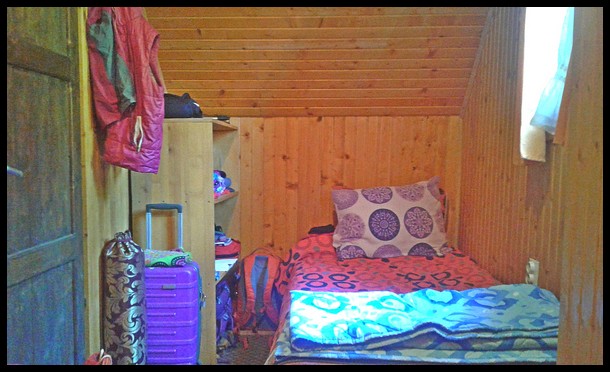 Private rooms in people’s homes – Interestingly, private rooms on Booking and AirBnB at most places in Montenegro average nearly the same as beds in a dorm! I usually paid 10 Euro per night at several places around the country.
Private rooms in people’s homes – Interestingly, private rooms on Booking and AirBnB at most places in Montenegro average nearly the same as beds in a dorm! I usually paid 10 Euro per night at several places around the country.
So if you prefer privacy, there’s generally no need to stuff yourself into a dorm room in Montenegro. You can usually find the most options by booking these places in advance (a month or more).
However, I did have to pay a whopping 20 Euro / $22.50 US per night for a couple nights in Kotor, as that was the cheapest I could find at the last minute.
Sobe – private rooms in people’s homes. You won’t usually find these Sobe online, but if you walk around or ask around at most destinations in Montenegro, you can find signs announcing ‘sobe’. Just go up and knock on the door to inquire about a vacancy and price.
I stayed at a wonderful sobe on the edge of Durmitor National Park for 10 Euro per night. This seems to be the going rate all over the country, at least in high tourist season. Prices might be lower in other months.
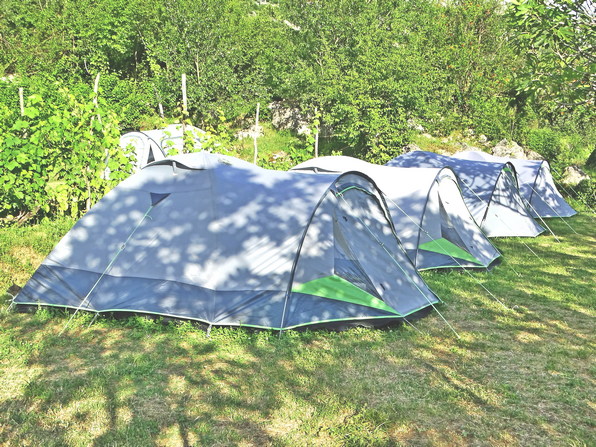
spacious tents at Camp Pod Ostrog
Camping & Park Cabins – Montenegro has five national parks, with Durmitor NP and Biogradska Gora NP being the two most easily accessible and popular. At Durmitor, privately-owned campgrounds are situated right on the edge of the park. Biogradska Gora has a campground within the park at the headquarters on the lake. Pitching your own tent costs 5-10 Euro. It’s also possible to hike into the wilderness and camp out on your own for free.
I camped at in the middle of Montenegro at the wonderful Camp Pod Ostrog. It’s located on a family farm run by a fantastic Montenegran guy named Milan. It’s just down the mountainside from famous Ostrog Monastery and a 15-minute walk from Ostrog train station. Camping in the farm’s tent cost me 10 Euro.
Read more about this greeat campground in my post Best Things to do in Montenegro.
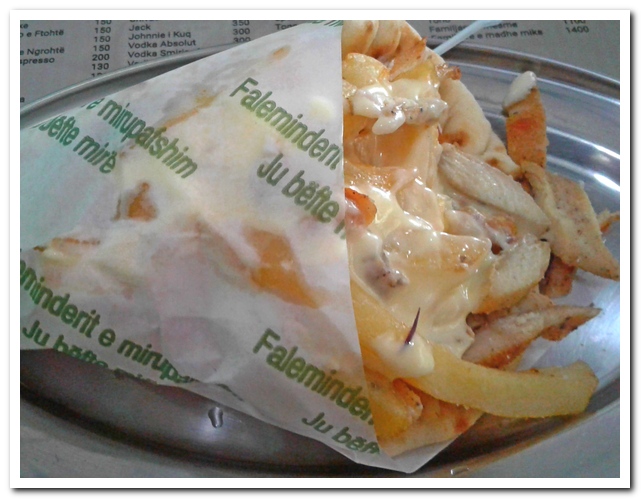 Costs of Food – Drink & Groceries
Costs of Food – Drink & Groceries
One thing I read about Montenegro from many other budget travelers before I arrived is that food costs a lot. I found that to be mostly true as well. Eating at most restaurants is fairly expensive, with meals generally costing about 5-15 Euro or more.
However, in most towns you can also eat local foods like meat, cheese or spinach byreks for just 1-1.50 Euro. Then a gyro sandwich (doner kebab) costs about 2.50-3 Euro. Any of these makes a complete meal for me, so that’s a super cheap way to eat. (Byrek is layered phyllo pastry with fillings, in Greek cuisine known as tiropita & spanakopita)
In addition, groceries, fresh produce & meat and fresh bakery breads are all quite inexpensive. A whole loaf of bread costs just 0.40-1 Euro! Fruits & veggies cost about the same as in the US or less. Chicken, beef & pork are also reasonably priced. Beef in Montenegro is especially delicious!
By grocery shopping, cooking most of my meals and eating regular byrek & gyros (doners) I was able to eat for just $8 per day on average. I did have a few restaurant meals here & there, so I could have kept my costs even lower if I’d stuck entirely to cooking for myself.
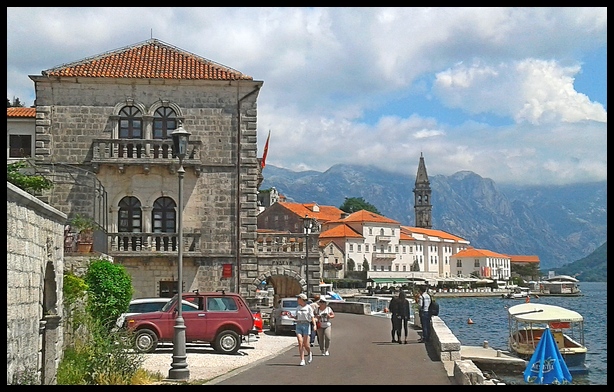 Conditions and Costs of Transportation
Conditions and Costs of Transportation
Montenegro has excellent road conditions. All over the country roads are well-paved and generally well-maintained.
The overland public transportation system is equally good. Modern buses in good condition run regularly between main towns and cities.
There are just a few slight downsides. First of all, for some reason the bus drivers all seem to be grim and unfriendly. Not sure why that is in Montenegro, but I don’t think I ever met a happy, smiling or friendly driver in this country!
Secondly, buses do not have toilets. Luckily, it’s a small country so most trips are just 1-2 hours long and most bus stations have a toilet, though you must pay a rather hefty fee of 0.50 Euro / $0.55 US per visit.
Third, Montenegro buses demand that passengers pay extra fees for luggage that goes in the underbus compartments. They charge 1 Euro per bag. This is a rather reasonable fee, considering they could charge 10 Euro or more.
Unfortunately for me, I have not one but two large bags that must do under the bus. So every time I took a bus I had to pay an extra 2 Euro / $2.25 US.
Again, in the scheme of things that’s not a fortune. But most of my bus fares were 6-8 Euro, which meant I had to pay 25-35% more for every bus I took. Over the course of five weeks, that added up to an extra 22 Euro / $25 US and my total trasnportation costs during five weeks was $108 US, which is actually a lot for ground transportation in just a month. Every little bit counts when you’re a budget traveler!
Montenegro also has a great train system that runs to some places. It’s just not as extensive as the bus system. In fact, there are only three main train lines out of Podgorica. One line runs north to the second largest city of Niksic (and past Ostrog Monastery). One line runs northeast to Mojkovac and beyond. The third line runs west to Bar on the coast.
The train between Podgroric and Niksic is an brand new, modern electric train! I was really astounded to see this train, so much like the clean, tidy Japanese trains that I rode for six years while living in Kyoto. It’s a great train – fast, efficient, clean and comfortable.
The other train lines use older, regular trains on tracks that put me in mind of the trains in Thailand. They are also comfortable and run on time.
Trains are even cheaper than buses in Montenegro! Train trips usualy cost just 1-3 Euro! Try to take one while you’re visiting.
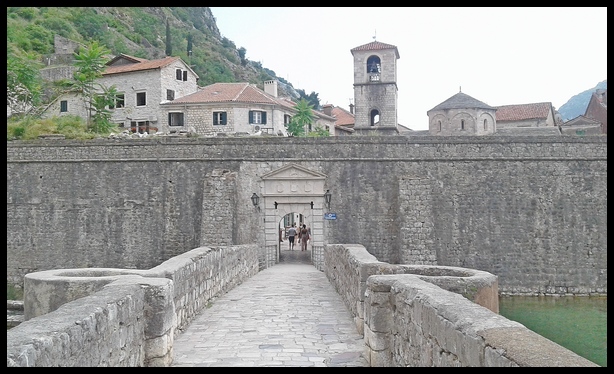
bridge to Kotor old town
Entrance Fees
Happily, there aren’t too many entrance fees for attractions in Montenegro. All the historic fortified stone towns – at Budva, Kotor and Ulcinj – are free to enter and wander around. Most churches and monasteries are also free.
The monastery ruins up on the mountain above Kotor town charges a hefty 8 Euro entry fee – IF you enter through the main points in town. Luckily, you can easily hike the back route up into the mountains and enter the site for free.
National Parks do charge an entry fee, which varies from park to park. Durmitor charges a daily fee! It’s 3 Euro for 1 day or 6 Euro for 3 days…then they charge you again if you stay longer. Generally by avoiding the lake area, you can skip the fees and still access most hiking trails.
Biogradska Gora NP just charges a one-time entry fee of 3 Euro. I’m not sure what the entry fees are at the other three national parks, but they’re not high.
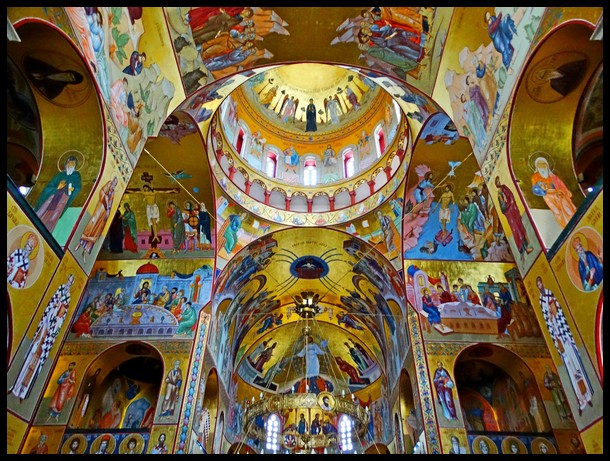
Serbian Othodox Cathedral – Podgorica
Low Cost Features of Montenegro
There are a few aspects of Montenegran life and customs that just naturally cut down on travel costs, without travelers having to do anything special. These things make travel in Montenegro naturally cheaper.
Montenegro has no visa or other entrance/exit fees
A great money-saving aspect of travel in the Balkan countries is that none of them require travelers to purchase a visa to visit. Travelers can just come and go as they please with no entry/exit costs… at least for nationals of the major world countries.
This really cuts down costs compared to vistiing countries where travelers must pay anywhere from $20-30-150 US for a visa.
Tap water is potable
Any country with potable water can really cut down on expenses for travelers, budget travelers in particular. Compared to having to buy bottled water, drinking tap water can save up to $30 per month or more.
In addition, there’s much less chance of getting any stomach/intestinal problems from eating & drinking since rinsing fruits, vegetables and other food items in tap water won’t cause any problems.
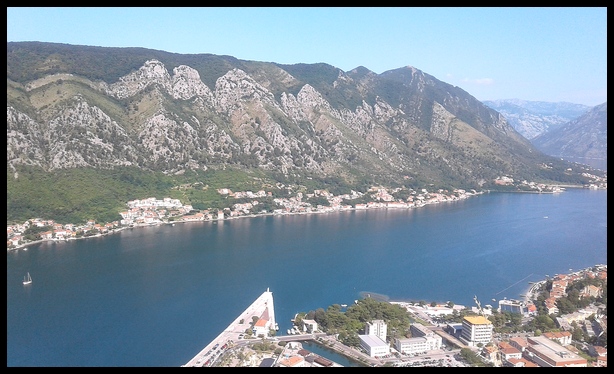
Kotor Bay
Extra Costs for Travel in Montenegro
On the other hand, I found some pesky little traveler fees rather annoying in Montenegro…
Public Toilet Fees
Wowie, talk about a country that likes charging high toilet fees and being stingy with toilet use!
Bus station toilets usually cost 0.50 Euro / $0.55 US, as do public toilets in parks, along beaches, in the historic old towns and any other public places. In addition, most restaurants, cafes & bars only allow customers to use their toilets, but in some places non-customers can get away with it.
When I got sick of paying for toilets all the time, I started finding ways to access free toilets in this country. I found them at shopping malls, department stores, luxury hotels and sometimes at restaurants, bars & cafes. Then there’s always McDonald’s and Burger King, although these are far & few between, happily!
Extra Bag Fees on Buses
As I noted above, all overland buses in Montenegro charge an extra 1 Euro per luggage that gets stored under the bus. It’s a reasonable fee, but can add up if you take lost of buses and/or have more than one bag, like I do. Sigh.
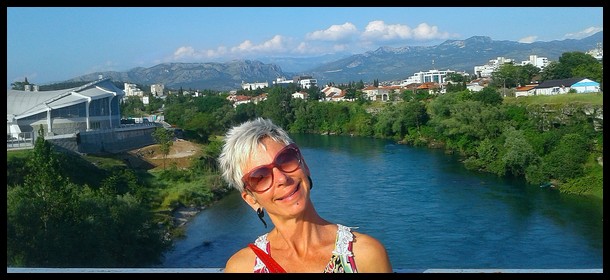
Lash at Moraca River – Podgorica – Montenegro
Summary
Montenegro is a beautiful & diverse country with stunning mountains & national parks, wonderful medieval fortified stone towns and a long coastline on the Adriatic Sea.
Montenegro is an easy country for budget travelers to explore, especially if they cook their own meals and make use of the many budget accommodation options around the country.
If you’re interested in visiting Montenegro, I’d advise getting there soon. The Balkan countries are becoming more & more popular as travel destinations. And if Montenegro becomes part of the EU, prices could go up quickly.
You might also like:
Costs of Budget Travel in Albania
17 Surprising Facts About Montenegro
===============================================

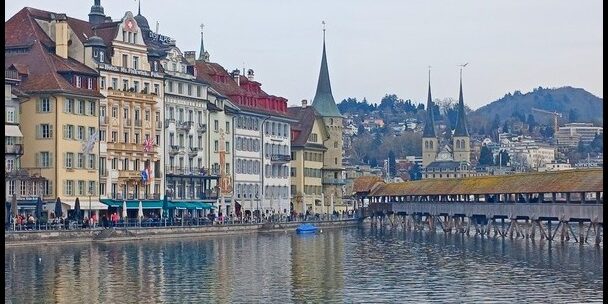
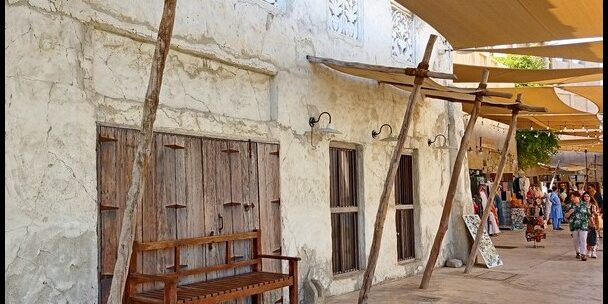
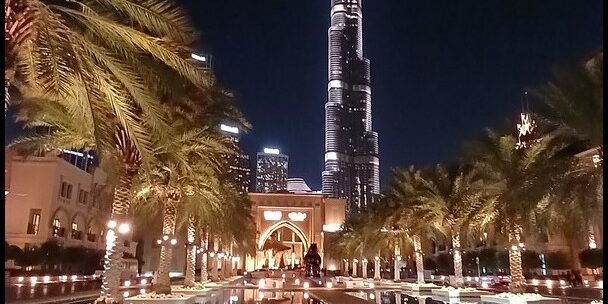
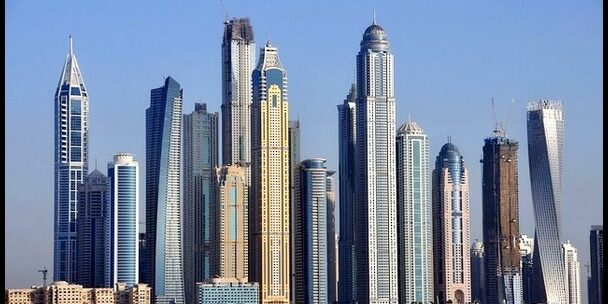
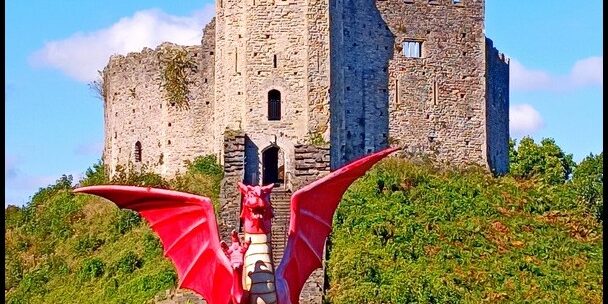



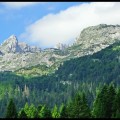

 Hi! I'm Lash, an American nomadic world traveler who's been traveling solo since 1998. I’m passionate about traveling the world nomadically and then sharing it all with you. I hope to inspire you to travel the world, to entertain you with tales from the road, and to help you reach your travel dreams. Welcome!
Hi! I'm Lash, an American nomadic world traveler who's been traveling solo since 1998. I’m passionate about traveling the world nomadically and then sharing it all with you. I hope to inspire you to travel the world, to entertain you with tales from the road, and to help you reach your travel dreams. Welcome! 


